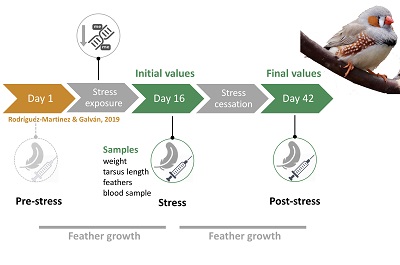Gene expression can be modulated by epigenetic modifications, which may lead to a rapid adaptation to environmental stress. After stress cessation, changes in gene expression could be reversed, which would allow organisms to maintain their phenotype under transient environments, but this mechanism is poorly understood. Social stress downregulates a gene directly involved in pheomelanin synthesis (Slc7a11) by changing DNA m5C levels, avoiding cellular damage caused by stress.
In a new study of the Doñana Biological Station, researchers Sol Rodríguez-Martínez and Ismael Galván investigated if Slc7a11 expression is reversed in melanocytes of growing flank feathers to avoid changes in the pigmentation phenotype. They measured the expression level of Slc7a11 at three time points: before stress exposure, immediately after stress exposure and six weeks after stress cessation in 37 male zebra finches (Taeniopygia guttata).
No differences in Slc7a11 expression were detected between birds exposed to stress and controls six weeks after stress elimination, indicating that stress removal led to a cessation of Slc7a11 downregulation. Reversibility in Slc7a11 expression, probably mediated by reversible changes in DNA methylation, may thus avoid altering the pigmentation phenotype during transient stressful conditions. This is one of the few studies in vertebrates supporting the idea that reversible gene expression responses allow organisms adapting to changing environmental conditions.
Reference
Rodríguez-Martínez, S., Galván, I. Slc7a11 downregulation is rapidly reversed after cessation of competitive social stress in zebra finches. Mol Biol Rep (2021). https://doi.org/10.1007/s11033-021-06256-6
https://link.springer.com/article/10.1007/s11033-021-06256-6

 Las altas temperaturas están provocando que las lagunas y las marismas de Doñana pierdan agua rápidamente
Las altas temperaturas están provocando que las lagunas y las marismas de Doñana pierdan agua rápidamente




